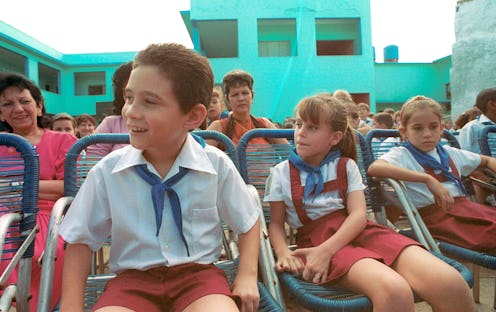News
Where's Elián Now?
Mind if we take a trip back a few years? More than a few, actually — a whole 14 years, back to the summer of 2000. Things were different back then — the dot-com bubble had just been burst, Bill Clinton was in the final year of his term after surviving impeachment two years earlier, and 9/11 was still a year away. But here's a question for you: What happened to Elián González, that little boy who was sent home to Cuba with his dad?
While the name may sound like a distant memory now, for a span of nearly seven months, in late 1999 and early 2000, our whole national media had its attention fixed squarely on Elián, an adorable 6-year-old Cuban boy. He was pretty much everywhere you looked in those days, as the story of his harrowing journey from Cuba to America, and the subsequent legal drama over his custody, helped to fuel the still-young cable news industry.
It seems like a perfectly fine time to check in, right? He's changed just as much as the world has, after all. Elián is now 20 years old, no longer the fresh-faced child we all saw on our screens. And according to an interview with the Miami-Herald, his time in the U.S. "changed him for life" — so what's going on with him now?
So, What Exactly Happened?
One Nov. 21 1999, a small boat set out from Cuba aiming to reach Miami. Aboard it were 6-year-old Elián and his mother, who wanted to escape Cuba for the United States. There were 14 people in all trying to make the trip, but thanks to mechanical failure and a storm, only three of them would ultimately survive — Elián and two others, his mother having drowned. He was recovered on Nov. 25 while floating in an inner tube, according to PBS, discovered by fishermen about three miles off Ft. Lauderdale.
He was taken to the hospital, and a day later released into the care of his uncle. What ensued was a full-scale political, social and legal drama over who held his custodial rights.
His father demanded that he be returned to Cuba, but his uncle and relatives in Miami were insistent that he be allowed to stay in the United States, attempting to file for asylum on his behalf.
Wow, What? Why They Couldn't They Reach an Agreement?
The two sides warring over custody of Elián both had pretty logical and compelling emotional claims. His father, Juan Miguel González, had every right to demand for his son to be returned, and to refuse could've been illegal under international law.
His Miami relatives and uncle, on the other hand, could hardly be faulted for thinking life in the U.S. might be in the best interests for the child — anti-Castro sentiment runs deep through much of Miami's Cuban expatriate population, and Elián had only managed to arrive in the U.S. at all through the mortal sacrifice of his mother. So, agreeing to send him back probably seemed unthinkable.
The political firestorm it kicked up was major. As The New York Times reported, after a federal judge rejected his Miami family's asylum request, then-Mayor of Miami-Dade County Alex Panelas stated that his police forces would not assist in any effort to return him to his father's custody, effectively leaving the job entirely to federal authorities.
And that's exactly what happened — Elián was taken from his uncle's home at gunpoint by federal agents on the morning of April 22, a scene which shocked and captivated the nation, and was returned to his father and members of his Cuban family at Andrews Air Force Base.
So, Where Is He Now?
Back in Cuba, where he's been living ever since returning there with his dad in 2000. And he's done well for himself — in late 2013, he was one of a 200-member youth leadership delegation that traveled to Equador, according to CNN. That Equadorian trip was actually the first time Gonzalez had even left Cuba at all since returning there as a child.
How Does He Feel About Everything That Happened?
He's happy to have made it back to Cuba, in spite of how hard it was for his family throughout that period of his life — at least that's what he's said when interviewed publicly, both on Cuban state media and in an interview with CNN.
It hasn't affected me, but it has been hard on my family because those were difficult moments. But in spite of everything, I'm in Cuba and that's great. Because it has been fifteen wonderful years in which I've experienced great growth, without precedence, as a Cuban revolutionary youth espousing the cause of the Cuban revolution.
Basically, he sounds as though he's a Castro loyalist, which is exactly the kind of outlook those relatives and protesters in Miami probably hoped he'd avoid.
To that end, his aunt told the AP in 2005 that she doesn't believe Elián's pro-Castro proclamations through the years, given the level of state control over Cuban media. That said, however, the only one who really knows is Elián himself — a young man, with a long and winding past, who seems pretty into FIdel Castro.
Fidel Castro for me is like a father. I don't profess to have any religion but if I did my God would be Fidel Castro. He is like a ship that knew to take his crew on the right path.
Images: Getty Images (4); El Telegrafo/YouTube
